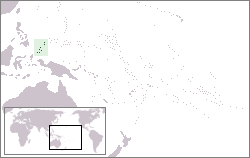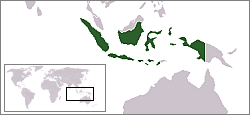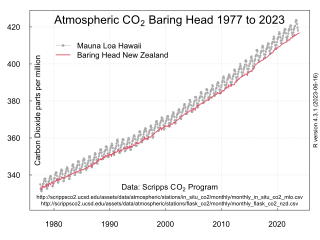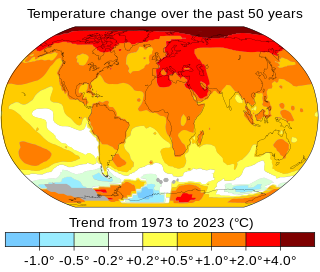
The environment of Palau consists of a number of islands in the western Pacific Ocean.

The environment of Palau consists of a number of islands in the western Pacific Ocean.
The avifauna of Palau includes a total of 149 species, of which 10 are endemic, three have been introduced by humans, and 17 are rare or accidental. Three species are globally threatened.
The Palau government are concerned about the effects of climate change on the island nation. In 2008 Palau requested that the UN Security Council consider protection against rising sea levels due to climate change. [1]
Tommy Remengesau, the president of Palau, has said:
Palau has lost at least one third of its coral reefs due to climate change related weather patterns. We also lost most of our agricultural production due to drought and extreme high tides. These are not theoretical, scientific losses -- they are the losses of our resources and our livelihoods.... For island states, time is not running out. It has run out. And our path may very well be the window to your own future and the future of our planet.
Palau consists of eight principal islands and more than 250 smaller ones lying roughly 500 miles southeast of the Philippines. The islands of Palau constitute part of the Caroline Islands chain.

Kiribati, officially the Republic of Kiribati, is an independent island nation in the central Pacific Ocean. The permanent population is over 119,000 (2020), more than half of whom live on Tarawa atoll. The state comprises 32 atolls and one raised coral island, Banaba. They have a total land area of 811 square kilometres and are dispersed over 3.5 million km2 (1.4 million sq mi).

Palau, officially the Republic of Palau and historically Belau, Palaos or Pelew, is an island country located in the western Pacific Ocean. The country contains approximately 340 islands, and together with parts of the Federated States of Micronesia, forms the western chain of the Caroline Islands. Its area is 466 square kilometers (180 sq mi). The most populous island is Koror. The capital Ngerulmud is located on the nearby island of Babeldaob, in Melekeok State. Palau shares maritime boundaries with international waters to the north, Micronesia to the east, Indonesia to the south, and the Philippines to the west.

The Philippine Sea is a marginal sea of the Western Pacific Ocean east of the Philippine archipelago, occupying an estimated surface area of 5 million square kilometers. The Philippine Sea Plate forms the floor of the sea. Its western border is the first island chain to the west, comprising the Ryukyu Islands in the northwest and Taiwan in the west. Its southwestern border comprises the Philippine islands of Luzon, Catanduanes, Samar, Leyte and Mindanao. Its northern border comprises the Japanese islands of Honshu, Shikoku and Kyūshū. Its eastern border is the second island chain to the west, comprising the Bonin Islands and Iwo Jima in the northeast, the Mariana Islands in the due east, and Halmahera, Palau, Yap and Ulithi in the southeast. Its southern border is Indonesia's Morotai Island.

The Pacific Islands Forum (PIF) is an inter-governmental organization that aims to enhance cooperation between countries and territories of the Pacific Ocean, including formation of a trade bloc and regional peacekeeping operations. It was founded in 1971 as the South Pacific Forum (SPF), and changed its name in 1999 to "Pacific Islands Forum", so as to be more inclusive of the Forum's Oceania-spanning membership of both north and south Pacific island countries, including Australia. It is a United Nations General Assembly observer.

Anote Tong is an I-Kiribati politician for the Pillars of Truth party with half Chinese heritage, who served as President of Kiribati, from 2003 to 2016. He won the election in July 2003 with a slim plurality of votes cast (47.4%) against his older brother, Harry Tong (43.5%) and the private lawyer Banuera Berina (9.1%). The elections were contested by the opposition, due to allegations of electoral fraud but the High Court of Tarawa had confirmed that there was no fraud. He was re-elected on 17 October 2007 for a second term (64%). In 2012, Tong was reelected for a third term, although with a significantly smaller percentage than in the previous two elections.

Tourism is the largest economic industry in the Maldives, as it plays an important role in earning foreign exchange revenues and employing 2500 people in the tertiary sector of the country. The archipelago of the Maldives is the main source of attraction to many tourists visiting the island country.

Environmental migrants are people who are forced to leave their home region due to sudden or long-term changes to their local environment. These changes compromise their well-being or secure livelihood, and include increased drought, desertification, sea level rise, and disruption of seasonal weather patterns. Climate refugees may flee or migrate to another country, or they may migrate internally within their own country.[2] Though there is no uniform and clear-cut definition of environmental migration, the idea is gaining growing attention as policy-makers and environmental and social scientists attempt to conceptualize the potential societal effects of climate change and environmental degradation.

Stuart Jay Beck was an American law practitioner and a diplomat for Palau. As a lawyer he helped negotiate the Compact of Free Association, which established Palau as an independent nation in free association with the United States in 1994. For his contributions to Palau, he was granted honorary citizenship. In 2003, he accepted the post for Palau's first Permanent Representative to the United Nations. He served continuously in this position until 2013, at which time he was appointed as Palau's first ever United Nations Ambassador for Oceans and Seas. In addition to that position, Beck co-chaired with Amir Dossal the Sustainable Oceans Alliance, an organization dedicated to the adoption by the General Assembly of a Sustainable Development Goal on Oceans.

The environment of Indonesia consists of 17,508 islands scattered over both sides of the equator. Indonesia's size, tropical climate, and archipelagic geography, support the world's second highest level of biodiversity after Brazil.
Islands First is a non-governmental organization working on behalf of the Small Island Developing States to confront the challenges of climate change, the depletion of ocean resources, and ocean level's rise.

Climate change in New Zealand refers to changes in the climate of New Zealand in relation to global climate change. In 2014, New Zealand contributed 0.17% to the world's total greenhouse gas emissions. However, on a per capita basis, New Zealand is a significant emitter – the 21st highest contributor in the world and fifth highest within the OECD.
Tuvalu became the 189th member of the United Nations in September 2000. Tuvalu is one of 14 states not recognising the People's Republic of China.

Tide gauge measurements show that global sea level rise began around the start of the 20th century. Between 1900 and 2016, the globally averaged sea level rose by 16–21 cm (6.3–8.3 in). More precise data gathered from satellite radar measurements reveal an accelerating rise of 7.5 cm (3.0 in) from 1993 to 2017, which is a trend of roughly 30 cm (12 in) per century. This acceleration is due mostly to human-caused global warming, which is driving thermal expansion of seawater and the melting of land-based ice sheets and glaciers. Between 1993 and 2018, thermal expansion of the oceans contributed 42% to sea level rise; the melting of temperate glaciers, 21%; Greenland, 15%; and Antarctica, 8%. Climate scientists expect the rate to further accelerate during the 21st century.

Regional effects of climate change are long-term significant changes in the expected patterns of average weather of a specific region due to climate change. The world average temperature is rising due to the greenhouse effect caused by increasing levels of greenhouse gases, especially carbon dioxide. When the global temperature changes, the changes in climate are not expected to be uniform across the Earth. In particular, land areas change more quickly than oceans, and northern high latitudes change more quickly than the tropics, and the margins of biome regions change faster than do their cores.
The World Ocean Conference 2009 (WOC) is an international conference to develop a common understanding and firm commitment to address the adverse impact of climate change on the state of the world's oceans, and increase understanding on the role of the oceans as ‘climate moderator’. This conference includes diplomats and heads of state from a number of countries. It took place in May 2009 in Manado, Indonesia. Its topic is the threat to various nations from rising oceans due to global warming.

Climate change in Tuvalu is particularly threatening for the long-term habitability of the island state of Tuvalu. This is because the average height of the islands is less than 2 metres (6.6 ft) above sea level, with the highest point of Niulakita being about 4.6 metres (15 ft) above sea level. Between 1971 and 2014, during a period of global warming, Tuvalu islands have increased in size, according to aerial photography and satellite imagery. Over four decades, there was a net increase in land area in Tuvalu of 73.5 ha (2.9%), although the changes were not uniform, with 74% of land increasing in size and 27% of land decreasing in size. The sea level at the Funafuti tide gauge has risen at 3.9 mm per year, which is approximately twice the global average.

Climate change in Bangladesh is a critical issue as the country is one of the most vulnerable to the effects of climate change. In the 2020 edition of Germanwatch's Climate Risk Index, it ranked seventh in the list of countries most affected by climate calamities during the period 1999–2018. Bangladesh's vulnerability to climate change impacts is due to a combination of geographical factors, such as its flat, low-lying, and delta-exposed topography, and socio-economic factors, including its high population density, levels of poverty, and dependence on agriculture.
The 45th Pacific Islands Forum was held from 29 July to 1 August 2014 in Palau. The forum's official opening was held in the capital Ngerulmud, in Melekeok State, but the majority of events were held in Koror, Palau's largest city and former capital. The official theme of the meeting was "The Ocean: Life & Future". Topics under discussion include climate change, commercial fishing, non-communicable diseases and the possibility of readmitting Fiji to the forum.

The effects of climate change on humans are far reaching and include effects on health, environment, displacement and migration, security, society, human settlement, energy, and transport. Climate change has brought about possibly irreversible alterations to Earth's geological, biological, and ecological systems. These changes have led to the emergence of large-scale environmental hazards to human health; such as extreme weather, ozone depletion, increased danger of wildfires, loss of biodiversity, stresses to food-producing systems, and the global spread of infectious diseases. In addition, climatic changes were estimated to cause over 150,000 deaths annually in 2002, with the World Health Organization estimating this number will increase to 250,000 deaths annually between 2030 and 2050.
Because of their low lying, ocean-fronted borders, relatively small land masses, and exposure to extreme weather and climate variability, island nations are especially vulnerable to global warming. As sea levels continue to rise, island peoples and cultures are being threatened. There are small and low populated islands without adequate resources available to protect the island and its human and natural resources. With the risks to human health, livelihoods and physical space in which to occupy, the pressure to leave the island is often barred by the inability to access the resources needed to relocate.